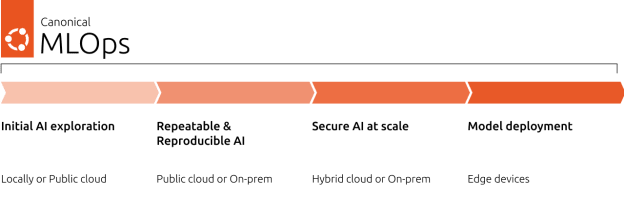Andreea Munteanu
on 17 June 2024
For 20 years, Ubuntu has been at the cutting edge of technology. Pioneers looking to innovate new technologies and ideas choose Ubuntu as the medium to do it, whether they’re building devices for space, deploying a fleet of robots or building up financial infrastructure.
The rise of machine learning is no exception and has encouraged people to develop their models on Ubuntu at different scales. With benefits such as robustness and community backing, there’s a reason Ubuntu is the preferred operating system for so many universities and research labs.
Whether we talk about developers tinkering with AI/ML or organisations looking to run their digital transformation initiatives in production, Ubuntu is still helping people push the boundaries of what’s possible.
This blog will explore the benefits that Ubuntu brings to ML projects and why it is becoming the system of choice for data scientists, ML engineers and AI enthusiasts should use Ubuntu as the operating system of choice for their ML projects.

1. Intuitive command line
User-friendliness is at the heart of Ubuntu. Ubuntu is simple to install and features an intuitive command line interface that can be integrated with the most popular machine learning frameworks, libraries and tools. Jupyter Notebook, Python, TensorFlow and PyTorch all enjoy support and timely updates from Canonical, the publisher of Ubuntu. All of this enhances productivity, simplifies the workflows and enables users to focus on the machine learning tasks.
We get that when experimenting, it might pose a risk to run things natively. Using Ubuntu for AI offers you the choice to quickly spin up virtual machines, using either Multipass or WSL, to run your models as would natively, without the risk to your native infrastructure. In addition to this, Ubuntu is compatible with a wide range of hardware platforms, of different architectures. It includes early access to accelerators such as CUDA and GPU support.
Read more about enterprise AI at scale with NVIDIA and Canonical
Download the whitepaper2. Run ML at scale from workstation to servers
Put simply, using Ubuntu for AI accelerates project delivery and helps developers easily migrate from a smaller-scale environment to a larger-scale one. But we understand that as projects mature, additional computing power is just one piece of the puzzle.
More sophisticated tooling for handling additional complexity is key to ensuring that ML is orchestrated efficiently and securely. Canonical provides open source tools that can expand your capabilities. By making use of charms, you can deploy models for various purposes in any environment: choose Charmed MLflow for experiment tracking, Spark and Kafka for big data or Kubeflow for Kubernetes. All of these can be easily maintained using Ubuntu as the operating system. These are official distributions of open source tooling that are packaged using Canonical’s mechanisms, in order to ensure simplified operations, security maintenance and easier deployment.
Learn how to get started with data science on Ubuntu
Watch the webinar now3. Develop secure ML projects
Data is the heart of any ML project. It often holds important information about an organisation or individual as well as the intellectual property of an enterprise.
That’s what makes it so valuable, which means it’s crucial to ensure it is well guarded. We should be mindful to protect it from any risk or leakage, as well as the artefacts such as machine learning models that are created at the back of it. A common difficulty with regard to security in machine learning is that of dependencies between packages. When a single “link in the chain” has security vulnerabilities, the entire chain is compromised.
Ubuntu Pro helps teams to address this need in a timely manner by fixing over 30,000 packages as part of the subscription. This includes machine learning tools such as Pandas, Python, Numpy, TensorFlow, or PyTorch, which enable professionals to develop. The security capabilities of Ubuntu go beyond that, including livepatching, confidential computing, and FIPS or DISA-STIG certifications.
4. Community support
Ubuntu is the most widely used Linux distribution in organisations (source: State of Open Source 2024), which translates into a large community of developers, users and enthusiasts, all working to improve it. They provide support, answer questions, write tutorials or further identify gaps that could move Ubuntu further for ML practitioners. It is beneficial for people at all levels with machine learning, from beginners who need more help to advanced users who can contribute back and improve Ubuntu, including in an AI context.
Whether you would like to ask your questions on Discourse, report a bug on Github or join some of the community events we are organising, there are several forums to help you get started.

5. Build on Long-Term Support Releases (LTS)
Canonical offers long term support (LTS) releases of Ubuntu, that are supported for up to 12 years, which includes security updates. They are launched every two years, with the latest one, 24.04 Noble Numbat, having been released in April 2024. LTS releases are appealing especially for ML practitioners who are looking for a well-maintained environment.
This allows ML practitioners to benefit from both stability and security in all of the environments in which they use Ubuntu.
Are you ready to take the next step?
These are just some of the reasons why machine learning professionals and enthusiasts prefer Ubuntu for their AI projects. As the industry evolves, we will all need to keep up and continue enabling the latest ML frameworks and libraries and improving the developer experience for ML practitioners. Are you using Ubuntu for ML projects? To get started, take a look at our suggested reading below.
Canonical MLOps tools can be run at different scales and for different levels of knowledge about machine learning.
- Data science stack for beginners: Data science and machine learning are an attractive area, where many people are looking to upskill. People often spend more time on setting up the environment, rather than developing the field capabilities. Data science stack (DSS) is an easy-to-deploy solution that can run on any workstation. It gives access to an environment to quickly get started with data science or machine learning. Read more about it.
- Charmed Kubeflow for ML at scale: Kubeflow is an end-to-end MLOps platform used to develop and deploy models at scale. It is a cloud-native application that runs on any environment, private or public cloud, supporting hybrid or multi cloud scenarios. It integrates with leading open source tooling such as MLflow or Spark. Try it out now!
- Upgrade your data science workflows with Ubuntu WSL: For those wishing to avoid dual-booting, running a second Ubuntu workstation or spinning up a cloud VM, Ubuntu on WSL delivers a compelling package. Its deep integration with Windows increases workflow efficiency and reduces the time to innovation whilst delivering comparative performance to Ubuntu on bare metal. Read more about it here.
To learn more about Canonical’s AI solutions, visit canonical.com/solutions/ai.




